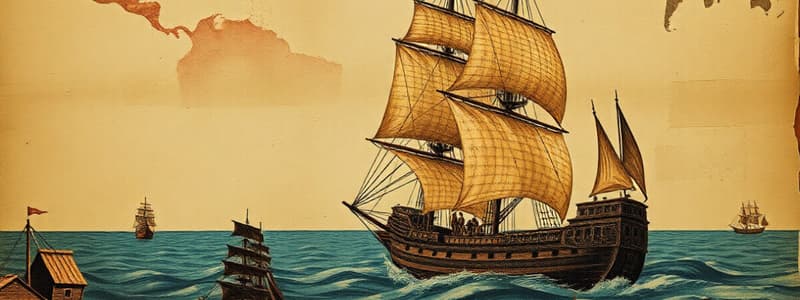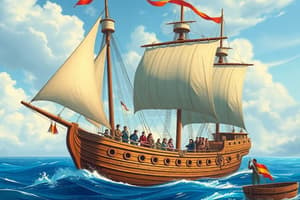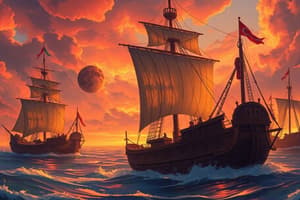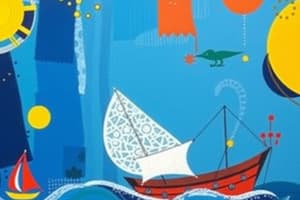Podcast
Questions and Answers
The discovery of America by Christopher Columbus is often cited as a turning point in ______.
The discovery of America by Christopher Columbus is often cited as a turning point in ______.
history
European trade expanded towards Africa and ______ in the late Middle Ages.
European trade expanded towards Africa and ______ in the late Middle Ages.
Asia
The Ottoman Empire created significant trade barriers via land routes after the conquest of ______ in 1453.
The Ottoman Empire created significant trade barriers via land routes after the conquest of ______ in 1453.
Constantinople
Portugal focused on the southern route, pioneered by ______ Dias' voyage around the Cape of Good Hope in 1488.
Portugal focused on the southern route, pioneered by ______ Dias' voyage around the Cape of Good Hope in 1488.
In 1492, Christopher Columbus, sailing under the Spanish crown, reached the ______, landing on an island he named San Salvador.
In 1492, Christopher Columbus, sailing under the Spanish crown, reached the ______, landing on an island he named San Salvador.
The Treaty of Tordesillas was signed in 1494 to prevent conflicts between Spain and ______ over newly discovered territories.
The Treaty of Tordesillas was signed in 1494 to prevent conflicts between Spain and ______ over newly discovered territories.
The discovery of America led to the exploitation and ______ of indigenous populations.
The discovery of America led to the exploitation and ______ of indigenous populations.
Initial accounts of indigenous people painted a picture of an exotic 'other', whether described as barbaric or as ______ and virtuous.
Initial accounts of indigenous people painted a picture of an exotic 'other', whether described as barbaric or as ______ and virtuous.
Flashcards
The Search for Alternative Sea Routes
The Search for Alternative Sea Routes
The practice of European nations seeking alternative sea routes to Asia in the 15th century to avoid Ottoman taxes and reach valuable markets.
Treaty of Tordesillas
Treaty of Tordesillas
The treaty signed in 1494 that divided newly discovered territories between Spain and Portugal, granting Spain most of Central and South America and Portugal Brazil.
From Trade to Conquest
From Trade to Conquest
The process of Europeans shifting from initial trade interest to conquering and exploiting territories discovered during exploration.
Portuguese Exploration Around the Cape of Good Hope
Portuguese Exploration Around the Cape of Good Hope
Signup and view all the flashcards
Christopher Columbus's Discovery of America
Christopher Columbus's Discovery of America
Signup and view all the flashcards
European Trade in the 15th Century
European Trade in the 15th Century
Signup and view all the flashcards
Gold as a Motive for Exploration
Gold as a Motive for Exploration
Signup and view all the flashcards
European Representations of Indigenous Peoples
European Representations of Indigenous Peoples
Signup and view all the flashcards
Study Notes
The "Discovery" of the Americas
- Christopher Columbus's voyage often seen as a turning point in history, but Europe discovered a continent already inhabited by 35-45 million people.
- Global trade in the 15th century saw European trade expanding towards Africa and Asia, particularly Italian city-states like Genoa and Venice.
- Land routes were challenged by Ottoman Empire control, leading to the search for alternative sea routes to India.
- Portugal and Spain sought to avoid Ottoman trade taxes and gain access to valuable resources in India.
The Search for Alternative Sea Routes
- Portugal focused on the southern route, utilizing the Cape of Good Hope, discovered by Bartolomeu Dias in 1488.
- Spain sought to reach India by sailing west.
- Columbus, acting on behalf of Queen Isabella of Castile, landed in the Bahamas in 1492, encountering the Americas.
The Treaty of Tordesillas
- To avoid conflict between Spain and Portugal, the Treaty of Tordesillas was signed in 1494, dividing newly discovered territories.
- Spain claimed most of Central and South America.
- Portugal received present-day Brazil.
Shift from Trade to Conquest
- Early European exploration in the Atlantic was primarily focussed on establishing trade routes.
- Portugal continued this practice initially, but the military strength of European powers allowed systematic conquest.
- The "discovery" of the Americas led to exploitation and the displacement of indigenous populations.
European Perceptions of Indigenous Peoples
- Early accounts of indigenous populations often presented them as exotic "others," either barbaric or innocent.
- Over time, the idea of "noble savages" emerged, viewing indigenous peoples as a contrast to European "corruption."
- These views changed over time and influenced justifying the conquest of the indigenous populations.
Studying That Suits You
Use AI to generate personalized quizzes and flashcards to suit your learning preferences.




